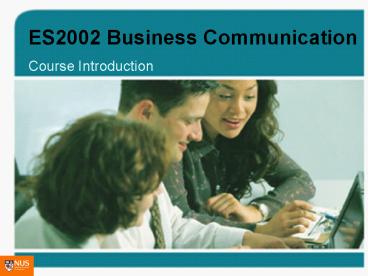ES2002 Business Communication - PowerPoint PPT Presentation
1 / 17
Title:
ES2002 Business Communication
Description:
Course Introduction Outline Importance of communication skills Course details Objectives Content Structure Assessment Mini lectures Recommended texts Tour of course ... – PowerPoint PPT presentation
Number of Views:320
Avg rating:3.0/5.0
Title: ES2002 Business Communication
1
ES2002 Business Communication
- Course Introduction
2
Outline
- Importance of communication skills
- Course details
- Objectives
- Content
- Structure
- Assessment
- Mini lectures
- Recommended texts
- Tour of course website
3
- The ability to communicate well is ranked the
number one key to success in Business, and the
Professions.
As executives reach middle management and above,
the primary criterion for advancement is
communication and motivation skills rather than
basic job performance.
4
Primary factors in achieving success (Executives
earning over 250,000)
- Communication Skills 71
- Intelligence 64
- Integrity 54
- Experience 50
- Enthusiasm, positive attitude 46
- Self-esteem/confidence 37
- Risk-taking attitude 35
- Formal education 29
- Ambition 25
- Emotional Maturity 16
5
Of the Singapore nationals hired this year, the
most common skill shortages cited across all
industry sectors are communication skills (15.1
percent), computer skills (12.5 percent) and
managerial experience (13.9 percent).
Source A job survey by TMP worldwide, a leading
global human resource consultancy with local
expertise across the Asian region reported in
The Straits Times, Recruit section, Tuesday, 30
October 2001.
6
they business communication courses teach
the one thing that is perhaps the most valuable
for the future employee to know This one basic
skill is the ability to organise and express
ideas in writing and speaking The letter, the
report, the memorandum, the ten-minute
presentation to a committee are basic tools of an
employee
Peter Drucker, The management guru
7
Course objectives
Course structure
- By the end of the course, you should be able to
- Understand the fundamental principles of
effective business communication - Apply the critical and creative thinking
abilities necessary for effective communication
in todays business world - Organise and express ideas in writing and
speaking to produce messages suitably tailored
for the topic, objective, audience, communication
medium and context - Demonstrate clarity, precision, conciseness and
coherence in your use of language
Course details
8
Course content
Course structure
- Communication models, principles and problems
- Meeting/group discussion skills
- Letter writing skills
- Report writing skills
- Intercultural communication skills
- Interpersonal skills
- Oral presentation skills
Course details
9
Course structure
Course structure
- Tutorial activities group discussions, class
presentations, mini lectures, case studies,self
and peer evaluations, discussion forums, and
others - Course materials
- readings from recommended texts and online
sources - course notes available online
- tutorial handouts
- Contact hours per week 4 (2-hr tutorials twice a
week) - Modular credits 4
Course details
10
Course assessment
Course structure
- Continual assessment 60
- Final examination 40
Course details
11
Continuous assessment (60 marks)
Course structure
More detailed assessment criteria for each
assignment available on the course website.
- Report (group) 20 marks
- Quality of report (80)
- Peer evaluation of report (20)
- Executive summary (group) 6 marks
- Letter (individual) 12 marks
- Project presentation (individual) 12 marks
- Performance on oral presentation (70)
- Self evaluation of oral presentation (30)
- Class participation 10 marks
- Performance on mini lectures (40)
- Performance on other criteria (60)
Course details
12
Class participation assessment
Course structure
- Demonstration of ability to take responsibility
for own learning - Turn up for tutorials and be punctual
- Print online course notes and/or PPT slides
- Make valuable contributions as a group
leader/member - Accomplish assigned tasks well
- Participate actively and constructively in class
discussions - Deliver mini lectures in a manner that will
effectively facilitate other students
understanding of the topics - Engage actively in e-learning activities
- Display an overall positive attitude
Course details
13
Are SMU students really different?
- The Straits Times, 11 February 2003 SMU
students are more confident and outspoken than
NUS and NTU students - The Straits Times, 12 February 2003
- SMU students are more vocal than NUS and NTU
students - More than half speak up in class
- They ask questions and offer opinions freely
Shouldnt we do something to change the
perception?
14
Mini lectures
Course structure
- You work in teams and take turns to undertake the
challenging task of explaining to your tutorial
mates about different topics on the course to aid
their understanding.
Course details
15
Mini lectures
Course structure
- Benefits you stand to gain
- You gain a better understanding and insight into
the topic to be taught - You get to take responsibility for your own
learning and become more independent learners,
while at the same time benefiting from
collaboratively working with others - You get to practise your oral presentation skills
and obtain useful feedback on them before your
final Project Presentation
Course details
16
Recommended text
Course structure
- Bovee, Courtland L., Thill, John V. and
Schatzman, Barbara E. 2005. Business
Communication Today. 9th edition. Upper Saddle
River, NJ Prentice Hall International Inc.
(Call No. HF5718 Bov2005)
Course details
17
Course website
- Access through
- IVLE (Centre for English Language Communication)
- http//courses.nus.edu.sg/course/elcchanj/ES2002//
index.htm































